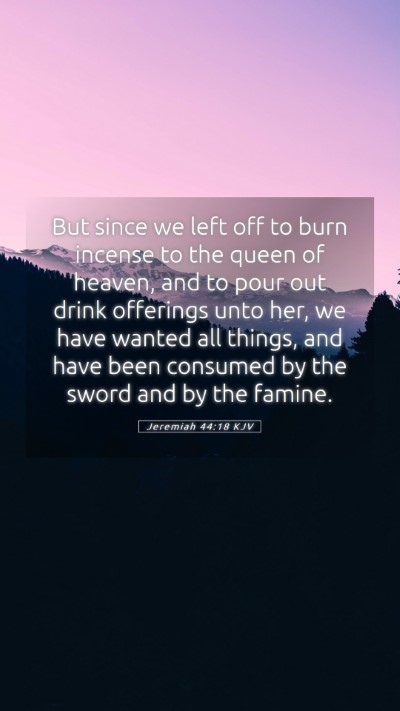Bible Verse Commentary: Jeremiah 44:18
Verse: Jeremiah 44:18 - "But since we left off to burn incense to the queen of heaven, and to pour out drink offerings unto her, we have wanted all things, and have been consumed by the sword and by the famine."
This passage from the Book of Jeremiah addresses the people of Judah in Egypt, reflecting their disobedience to God and the repercussions that followed. The significance of this verse lies in its commentary on idolatry, the consequences of turning away from God's commandments, and the misguided rationale of the Israelites in seeking favor through the worship of foreign gods.
Meaning and Interpretation
Understanding the depth of this verse requires an appreciation of its context within the entire chapter and the broader narrative of Jeremiah as a prophetic book. Scholars including Matthew Henry, Albert Barnes, and Adam Clarke provide valuable insights that can help decode the meaning of this passage.
Historical Context
Jeremiah prophesied during a tumultuous time for the Jewish people, particularly after the fall of Jerusalem. The desired security led some Israelites to flee to Egypt, where they continued to practice idolatry. This led to disastrous consequences, underscoring the recurring theme of disobedience against God throughout the Scriptures.
Exegesis and Analysis
- Commentary from Matthew Henry: Henry emphasizes the futility of idol worship and how the Israelites recognized that their troubles stemmed from abandoning the true worship of God. The burning of incense to the queen of heaven symbolizes their direct rebellion against God's commandments.
- Insights from Albert Barnes: Barnes notes that the phrase ‘queen of heaven’ likely refers to a fertility goddess known in pagan cultures, reflecting the people’s attempt to secure prosperity through idol worship instead of loyalty to Yahweh.
- Analysis by Adam Clarke: Clarke points out the irony that despite their devotion to idolatry, the people suffered even more—heightening their need for repentance and the seeking of the true God, which they continued to resist.
Theological Implications
This verse underscores critical theological concepts such as:
- The Nature of Idolatry: It challenges believers to examine what "gods" they may be serving that are not aligned with biblical truths.
- The Consequence of Disobedience: The direct correlation between the abandonment of God and subsequent trials reinforces the idea of divine justice.
- The Call to Repentance: This passage is ultimately a call for a return to God, highlighting that true security and sustenance come only from Him.
Application and Relevance
In applying the truths contained in Jeremiah 44:18 to contemporary life, one may consider:
- Identifying modern-day "idols" that distract from a full commitment to God.
- Recognizing the importance of worship and devotion in fostering a relationship with Him.
- Understanding the historical context of biblical passages aids in grasping their significance today.
- Realizing the importance of community, encouraging participation in bible study groups to explore these themes collectively.
Related Bible References
This verse connects with other Scriptures that elaborate on similar themes:
- Exodus 20:3-5: The commandment against having other gods.
- Isaiah 44:9-20: A description of the foolishness of idol-making.
- Jeremiah 1:16: God's judgment against those who forsake Him for idols.
- Hosea 4:6: The consequences of rejecting knowledge and straying from God.
- James 4:4: Friendship with the world as enmity with God.
Conclusion
Jeremiah 44:18 serves as a stark reminder of the dangers of idolatry and the consequences of turning away from God's commandments. Studying this verse through various lenses of Bible verse meanings, interpretations, and historical context reveals profound truths that resonate with our modern walk of faith. For those interested in deeper bible study insights, it is essential to incorporate not just individual study but also group discussions to broaden understanding and application of such impactful truths.


